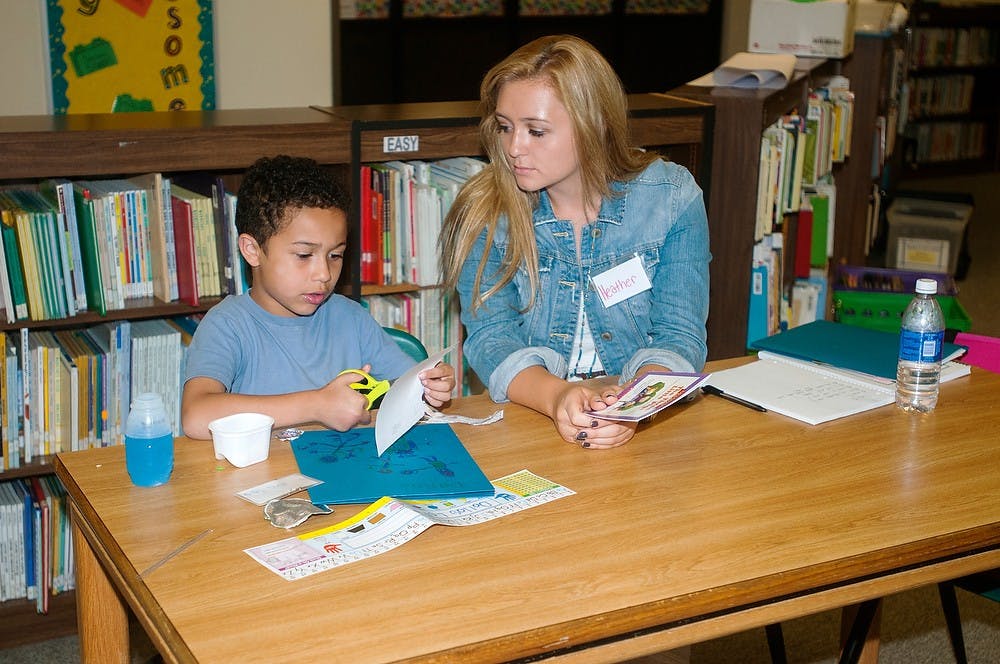One member of her staff refers to her as the “Mother Theresa of Literacy.”
But Lois Bader claims she’s just doing what she loves.

Lansing resident Dallas Lott, 7, left, follows instructions from marketing freshman Heather Rauch on Sept. 29, 2014, at Riddle Elementary School, 221 Huron Street. Lott and Rauch participated in the Capital Area Literacy Coalition which provides one on one help to children, teens, and adults who are struggling with writing and reading. Jessalyn Tamez/The State News
One member of her staff refers to her as the “Mother Theresa of Literacy.”
But Lois Bader claims she’s just doing what she loves.
Bader is the executive director of the Capital Area Literacy Coalition and its Read to Succeed program, which is celebrating 30 years of helping Lansing area students develop literacy skills after the school day ends.
Every year, the Read to Succeed program recruits MSU students and gives them professional training to later take a child one on one for a semester to develop a struggling student’s literacy skills. College students can tutor as a volunteer opportunity or for class credit, and the program is free of cost to the students being tutored.
According to Bader, who started the Read to Succeed program in 1985, many of Lansing’s public elementary schools rank below the 10th percentile in regards to student reading comprehension. Bader said that puts them behind not just in reading, but in all other subjects, too.
“Because of the reading problem in Lansing schools, we’re at the bottom of the state,” Bader said. “With math, if you can’t read the story problems, then you’re only going to go so far.”
Illiteracy has been an issue in Lansing for decades. Based on numbers she cited from the Capital Area Literacy Coalition’s website, it’s a near epidemic at many different levels of schooling.
“This is extremely serious,” Bader said. “Half of the high school students in Lansing read at a third-to-fourth grade reading level. Half of them.”
The after-school one-on-one tutoring gives students the direct attention they need to progress faster than they would in a normal classroom, Bader said.
In an example provided by the organization, 10 second grade students at Gier Park Elementary in north Lansing who had a reading comprehension level of kindergarten or below completed the Read to Succeed program with a tutor last school year. By the end of that program, Bader said each student had “equivalent grade-level, or above” reading comprehension upon their graduation from the Read to Succeed program.
That means each student bumped up two, if not three, grade levels over the course of the reading initiative.
It’s the Read to Succeed coordinator, Pat Williams, who gave Bader the previously mentioned “Mother Theresa of Literacy” moniker. She said the program would be nowhere without Bader, who works long hours and takes no wages.
“She works tirelessly for this — day and night,” Williams said. “She’s amazing.”
A retired literacy professor of 35 years at MSU, Bader downplayed her lack of salary, joking that the program’s other full-time staff is “not well-paid, either.”
Assistant director for the Capital Area Literacy Coalition Dee Clark says the program keeps its head above water with smart spending and continuous re-investment in the organization.
“We’re very tight-fisted, and we only have three full-time people,” Clark said. “Our funding goes back to the program.”
And despite the constant search for funding, Williams says the program’s biggest handicap is a lack of manpower.
“We know how to do it, and it can be fixed,” Williams said. “But we have to get more people to help us. If we had 1,000 people rather than 100, the Lansing school district could get turned around in a few years.”
Support student media! Please consider donating to The State News and help fund the future of journalism.